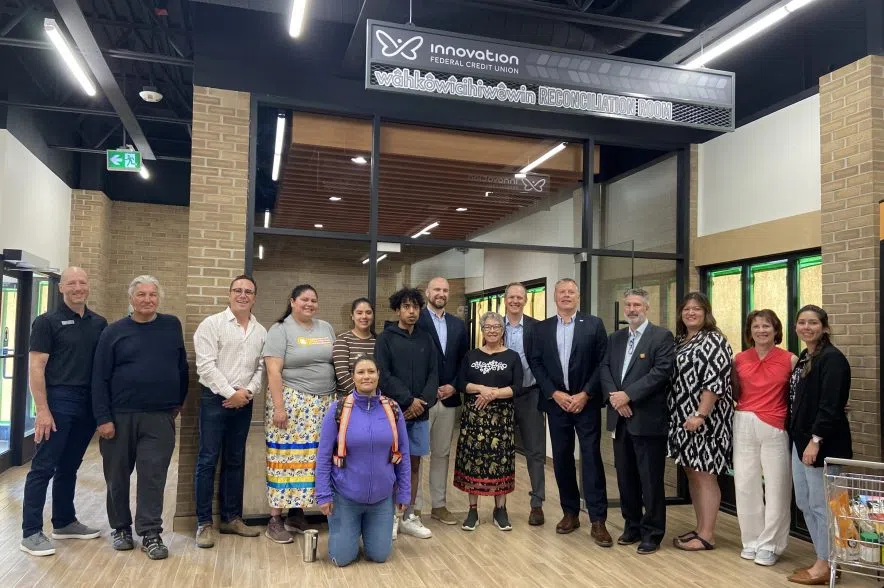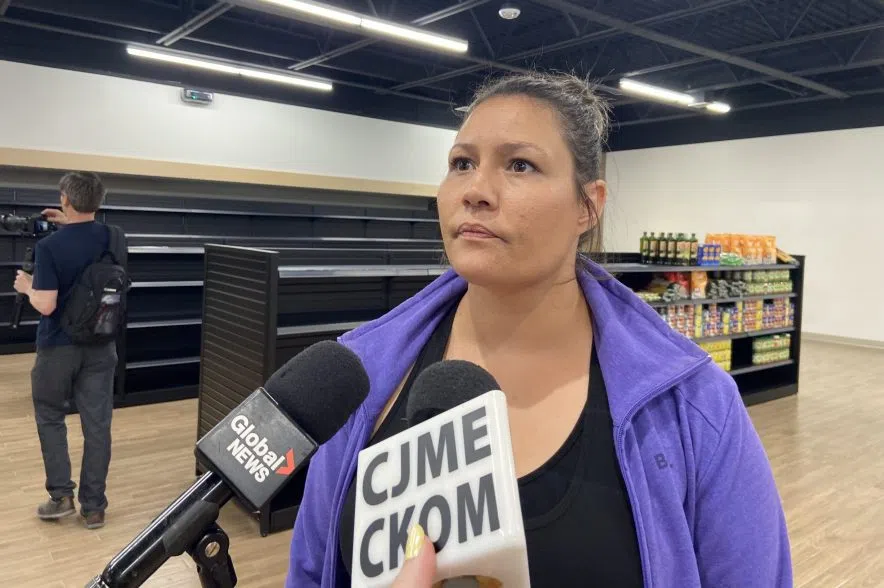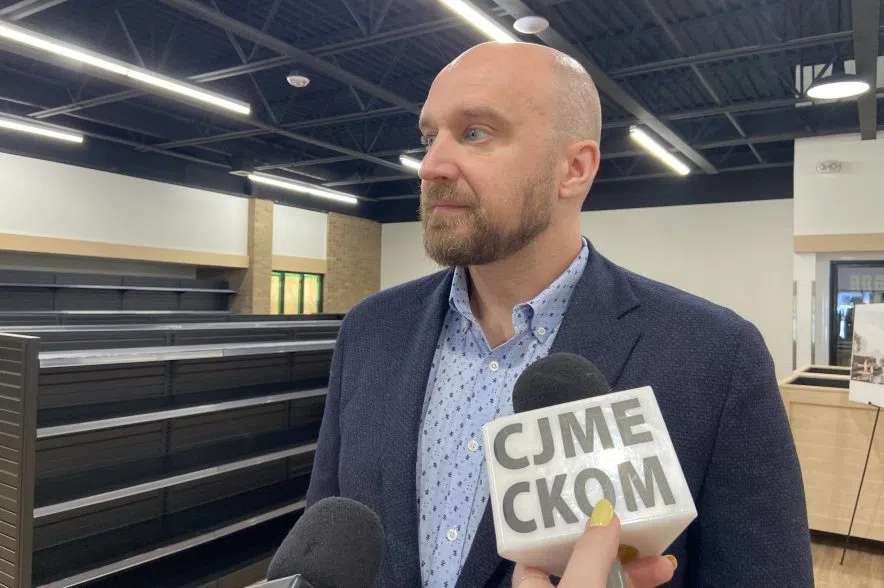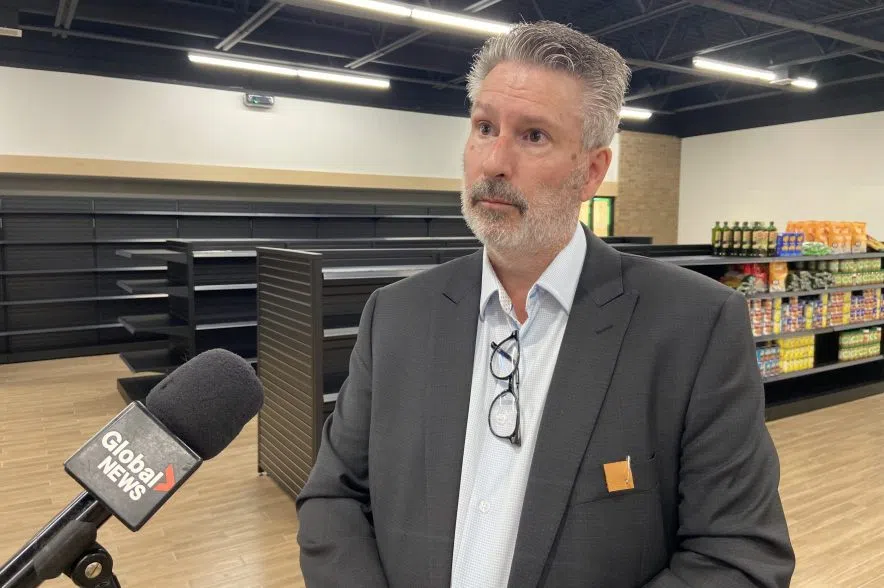Regina’s new food hub is set to open in just under a month.
Unlike the large warehouse on Winnipeg Street, the food hub at 1881 Broad Street will operate like a grocery store, but it is also the location for a special space called the Wâhkôwîcihiwêwin Room, which means reconciliation room.
Michelle Balkwill is a full time employee at the food bank. She said the room is a step in the right direction.
“I think it shows that we’re incorporating and thinking about Indigenous communities, and we know that there’s a need for these things,” she said.
“I think it helps bridge the gap that is there. Especially when someone comes in and sees this is a comfortable space. Maybe they need help with something else, that smudge room is there if they need that kind of a thing. They might come in for food but it might be on a deeper level that they need something.”
The new space is laid out like a grocery store, Balkwill said this will give food bank users dignity.
“People don’t have that dignity when they come in and this is going to give them that freedom,” said Regina Food Bank employee Michelle Balkwill about the new food hub. (Nicole Garn/980 CJME)
“A lot of clients that come in, their dignity is down because they’re coming and asking for help,” she said.
“Especially if you think of someone who’s the head of the family and they can’t provide for their family. That dignity that they have as that person who’s in charge of that household they are coming in and they are almost embarrassed to ask for this kind of help.
“I think it’s going to be great for people to feel like they are able to get the things on their grocery list. They aren’t going through a line and system. They’re coming in, welcomed and it’s open. They get to choose the things they need in their house. People don’t have that dignity when they come in and this is going to give them that freedom.”
Read more
- Canada apologizes for labelling Dakota, Lakota second-class First Nations
- Trade minister says dropping carbon tax kept Sask. inflation rate low
Balkwill sees firsthand what food bank users go through. She hopes the new hub will provide a sense of normalcy.
“When they come in, I can see the look on some of their faces when they have to just go through the lineup and get their food,” she said. “It’s kind of emancipating almost — when you are stripped of that freedom to choose what you’re family needs and what they can eat.”
Balkwill has great hopes for the future of the food hub.
“I do love my job,” she said. “What I’d like to see long-term is just more people aware of the food bank. A lot of people don’t really know what the foodbank is or what it does. I’d also like to see us reaching more communities and I think this placement is really good.
“I’m excited to see how this is all going to work and I think it will help with clients’ wait times because we only have one warehouse. In the long-term, I want to see people being able to get their food regularly and feeling comfortable enough to come in and get their food.”
Regina Food Bank CEO John Bailey is excited for the new hub to open in mid-August. (Nicole Garn/980 CJME)
‘Nuturing the spirit and soul’
John Bailey is the CEO of the Regina Food Bank.
He said actions speak a lot louder than words.
“The reconciliation room here is part of our ongoing effort to make sure that we’re (not only) being incredibly conscious of the folks we serve but also the land we live and operate on,” he said.
“It’s about giving us an opportunity to teach and nurture the spirit and the soul of the community as well as providing the nourishment for the body.”
The Wâhkôwîcihiwêwin Room will be used for a number of ceremonies and learning opportunities, and the food hub plans to bring in school students to teach them about financial and nutritional literacy.
“The way the space will work is groups or individuals can book through the food bank,” he said.
“We will also do scheduled quarterly or even more frequently smudging events to make sure the room gets used for its intent. For right now we want to make sure we are able to fulfill the promise. We don’t want to over promise how active the space will be. But we do have plans to make sure it is at least quarterly.”
Bailey explains the space is offered by the hub and the community can use it whenever they need.
“We’re not here to control or own the programming, we want to have a space that we can have available for the community to make use of,” he said.
Bailey said the food bank is still seeing a high number of users.
“We continue to see record numbers month by month, year by year,” he said. “We’re up another 20 per cent from last year which continues to be a growth that has never been seen before.
“We are hopeful that, at some point, the inflation levels will start to stabilize so people can get their feet back underneath them. But even the drop we’re seeing right now is not necessarily affecting a household budget in the same way in a more macro-economic sense.”
The reconciliation room was brought to life thanks to a $250,000 investment from Innovation Federal Credit Union.
“The long-term kind of goal is financial independence and well-being and really affordability. But there will always be scenarios where it’s not, so we can’t leave anybody behind,” said Dean Gagné with the Innovation Federal Credit Union. (Nicole Garn/980 CJME)
Dean Gagné is the chief disruption officer for the Innovation Federal Credit Union.
“We’ve sponsored the reconciliation room to allow for additional funding beyond just the food bank itself for Indigenous-led education on food sovereignty and uses of food, and also Indigenous language,” he said.
The credit union runs on cooperative principles. Customers are part of everything.
“A huge principle for us is concern for the community,” he said. “We give two to four per cent of pre-tax profits back to the communities in which we operate. We also have legacy funds that we set up for communities. We also have an Indigenous legacy fund that’s $1,000,000 from which we distribute $100,000 per year over a 10-year period.”
His long-term hope for the future is to see community members become financially independent, but until that happens the credit union would be there to help.
“The long-term … goal is financial independence and wellbeing and … affordability,” Gagné said. “But there will always be scenarios where it’s not, so we can’t leave anybody behind.”
Read more














